Top human resources survey questions
- Why do you want to work for this company?
- Is there any reason you wouldn’t consider taking this role?
- Do you have the right work-life balance at this organization?
- What motivates you at work each day?
- Where do you see yourself in the next three years?
- How can we support your career goals in the next 12 months?
- Do you feel like you can be yourself at work?
- Do you feel respected by your manager and colleagues?
- In what areas do you feel that the company could improve?
- What prompted you to leave the company?
- How do you feel about the change overall?
- Do you fully understand how this change will impact your role at the company?
Recruiting and hiring, onboarding and training, engaging and retaining — these are some of the crucial aspects of employee management that human resources departments oversee. As the connection between the employee experience and business outcomes becomes clearer, companies are seeing effective HR departments as essential for business success.
To create an environment that promotes success, HR teams need to understand what employees think and feel. Surveys are an essential component of the HR toolbox — they give employees a voice and identify issues that might be otherwise invisible to management.
In this article, we’ll dive into the benefits of conducting HR surveys, provide examples of useful HR survey questions, and introduce you to Jotform — an easy-to-use tool that makes creating HR surveys a cinch.
Pro Tip
Customize your company’s recruitment and review practices with Jotform’s free, easy-to-use surveys.
The value of HR surveys
HR surveys gather valuable insights that can guide business decisions.
“Surveys are used by HR and the management team for genuine and candid staff feedback,” says Sara Graves, founder of USTitleLoans, a company that helps car owners get peer-to-peer loans. “The surveys can drastically improve how a company evaluates talent, trains employees, and improves employee satisfaction.”
And that’s not all — below are even more possible outcomes from HR surveys, all of which benefit your business. But remember, the real value comes not just in asking questions, but in following up. After analyzing the survey results, HR needs to implement changes to address employee feedback.
The process of surveying employees and making adjustments based on their feedback shows a genuine level of care.
Increased employee satisfaction
Numerous factors affect employees’ job satisfaction: the level of support they get, company leadership’s communication style, compensation and benefits, the physical and psychological work environment, and more. Unsurprisingly, employees who are highly satisfied have a better attitude about work, which translates into greater productivity.
Asking the right HR survey questions can help you understand what people expect from their jobs and whether you’re meeting those expectations. By addressing the gaps, you may be able to head off future resignations and even attract strong job candidates — a positive and enthusiastic work environment can help with recruitment.
Improved employee engagement
Employee satisfaction is also related to employee engagement — employees are more likely to care more and give more to their work if they feel like their work also gives back to them.
Employee engagement has been linked to a number of performance outcomes. For instance, highly engaged employees are more productive, have fewer safety-related incidents, and are absent from work less often. They also are more likely to stay with a company longer.
HR surveys can be useful in gauging employees’ emotional connection to the company, their work, and their teams. Surveys can also help identify obstacles to engagement.
Greater productivity
Helping employees feel more satisfied and engaged isn’t just good for them — it’s also good for employers. In fact, one study found that employees who are happy and satisfied with their jobs are 13 percent more productive than unhappy employees. People who are happy with their circumstances are more motivated, which can contribute to their output.
HR surveys can help you identify obstacles to employee happiness, allowing you to make a plan to address those problems. They can also pinpoint process inefficiencies and other workflow problems that can contribute to employee frustration.
Asking the people actively engaged in those processes about any issues and their ideas for fixing them is a great way to spot oversights and areas for improvement. When you address issues employees raise, it can help them feel respected and taken care of.
Boost employee retention
Whether or not you’re struggling with employee retention, it’s useful to conduct HR surveys to gauge how the workforce is feeling, find out what you’re doing well, and learn how you can do better.
Even if the turnover rate is fairly low, it’s helpful to know what you’re doing right so you can continue doing those things. What aspects of your company and culture make people want to stay? Conversely, if your turnover rate is high, you can find out about the key problems and work to address them.
Improve customer service
It’s difficult to create a good customer experience without creating a good employee experience, as the two are inextricably linked. Customer service reps who are knowledgeable, empathetic, responsive, and enthusiastic are more likely to serve customers well — which is much more difficult if workers are disgruntled or dissatisfied.
It’s a great idea to survey your customer service team periodically to learn more about their experiences as employees. You can also check in to see if they feel they have all the tools they need to do their jobs successfully.
Create a human resources survey preloaded with these 30 questions.
Types of HR survey questions
1. Recruitment questions
As a major function of human resources, recruitment is essential to ensuring the organization has the right people on its team. Surveys can provide insight into the recruitment process, including what’s attractive about the organization and what could potentially be turning people off.
Here are a few questions to consider for a recruitment survey:
- Why do you want to work for this company?
- On a scale of 1–10, how would you rate the recruitment process?
- Is there any reason you wouldn’t consider taking this role?
- Would you recommend this company to a friend looking for a job?
- Do you have any feedback on the application process?
2. Employee engagement and satisfaction questions
Organizations need to have their finger on the pulse of employee sentiment. If people aren’t pleased with certain aspects of the workplace, they may start looking for other opportunities.
“Unfortunately, most surveys only look at satisfaction, so an accurate picture of the workplace is never obtained,” says Graves. “Managers or supervisors can easily manipulate results to make themselves feel better.”
Here are a few questions to help you get a deeper understanding of employee engagement and satisfaction:
- Do you have the right work-life balance at this organization?
- Do you feel a sense of camaraderie with your team members?
- What do you like least about coming to work each day?
- Do you understand how your role contributes to the company?
- What motivates you at work each day?
3. Employee performance questions
Self-evaluations are key parts of the performance evaluation process, as they can help organizations understand how employees feel about their own work — and how that compares to a manager’s assessment.
“It’s good practice to conduct HR surveys frequently or quarterly, depending on your study focus,” says Graves. “Also, don’t opt for long surveys, but keep them short and precise for a faster completion rate.”
Consider these HR survey questions for self-evaluations:
- Do you have the resources to complete all the tasks in your role?
- What are you most proud of about your performance this quarter?
- Which challenges did you face this year? How did you overcome them?
- Where do you see yourself in the next three years?
- How can we support your career goals in the next 12 months?
4. Work culture questions
An organization’s culture can be hard to define, but employees usually have clear opinions on it. It’s valuable for HR to understand how employees feel about company culture, as it plays a vital role in employee retention and turnover. Graves notes that culture-related questions also provide insight into a company’s perceived values and where management can make improvements.
Here are a few questions for a survey on company culture:
- Do you know how this organization defines success?
- Do you feel like you can be yourself at work?
- If you’re in an uncomfortable situation, do you know who to turn to at work?
- Do you feel respected by your manager and colleagues?
- In what ways can the company improve the work culture?
5. Exit interview questions
Employees who are on their way out are valuable sources of information. Understanding why someone is leaving may shine a light on areas that are problematic for other employees as well, such as a lack of perceived career development options, compensation issues, or poor leadership.
It’s a good idea to send a survey in advance of the exit interview so you have some data on which to base your in-person interview questions.
Exit interview survey questions could include
- What prompted you to leave the company?
- Were you given the tools you felt were necessary to succeed in your role here?
- Do you feel your contributions were adequately recognized and appreciated?
- Would you consider returning to the company should the right opportunity arise?
- In what areas do you feel that the company could improve?
6. Change management questions
Times of change — whether related to processes, team organization, systems, or other job aspects — can be stressful for employees. But a good survey tool can help you learn about employees’ concerns in real time and allow you to respond to their worries, making transitions smoother.
It’s also a good idea to survey employees both before and after changes to get a full picture of concerns going into a transition, how the change impacted the organization, and whether it’s having its intended effect. The information you collect will be useful in managing future transitions.
Here are some questions to ask as part of a change management survey:
- Do you feel the communication surrounding this change was clear and adequate?
- Do you fully understand how this change will impact your role at the company?
- Do you feel you have the resources you need to accommodate this change and continue to perform your job successfully? Do you need additional support?
- What is your perception of how smoothly the change is being implemented in your department?
- How do you feel about the change overall?
Best practices for HR surveys
Here are some best practices for conducting HR surveys that can help your efforts pay off:
- Avoid over-surveying. Too many surveys (and too many questions on a survey) can be a turnoff. Ensure your surveys don’t go out too frequently, and limit the number of questions on them. Employees might see long surveys that come out too often as tedious and be more skeptical of their feedback being considered. You’ll also give yourself more time to analyze and act on the responses.
- Don’t send surveys when employees are particularly busy. Avoid sending your survey during parts of the year that tend to be more hectic and stressful, or when more employees are on vacation, like summers and holidays. Employees will be more likely to complete the survey if they have greater bandwidth and don’t feel overwhelmed.
- Create an intentional survey strategy. Surveying will be more effective if you’re strategic about your questioning. For example, rather than surveying randomly, you could do more frequent, short surveys to check in with employees about specific issues. Or you could make a plan to conduct longer, annual surveys to learn about the employee experience more broadly.
- Create anonymous surveys. Many employees worry that submitting negative survey responses might cause retaliation. You can grant them a measure of security by making your surveys anonymous. People will be more likely to participate and feel free to speak their minds, which will give you better data.
- Send completion reminders. Most people won’t act on your initial survey message right away; they’ll likely put it aside until they have enough time to complete the survey thoughtfully. The pitfall here is that people might forget about it. You can increase your response rate by sending occasional reminders to participants. (Some survey platforms, like Jotform, can do this for you automatically.)
- Don’t survey unless you’re willing to follow through. Acting on survey responses is critical — people will eventually stop responding if they feel you aren’t actually listening. For example, you probably shouldn’t ask employees how they feel about their work hours if you aren’t willing to consider creating alternative arrangements.
HR survey questions with Jotform
If you’re ready to get valuable feedback from your employees, it’s important to create HR surveys that are both powerful and easy to use. With Jotform, human resources teams can use ready-to-go survey templates covering employee engagement, self-assessments, exit interviews, and more. You can also create apps to house multiple surveys, allowing you to track multiple surveys in a centralized location.
Each survey template is fully customizable — add or remove question fields, change the fonts and colors, adjust the layout, and more. Your human resources team can create a survey that meets their exact needs. You can also easily create an HR survey from scratch with our intuitive drag-and-drop Form Builder. Choose from multiple question types, including scale ratings, multiple-choice questions, and open-ended questions.
Once your survey is complete, view automatically generated reports analyzing the responses with Jotform’s Report Builder, helping you quickly identify key themes and metrics.


















































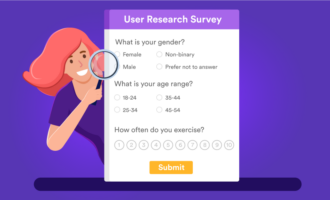





































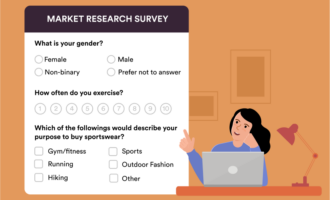




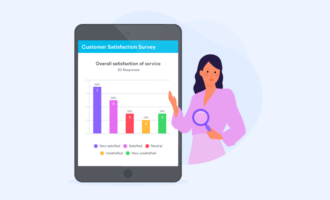

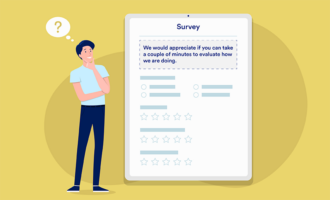





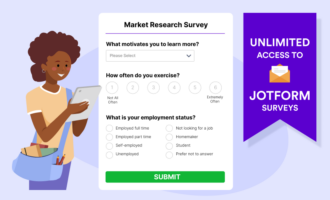

Send Comment: